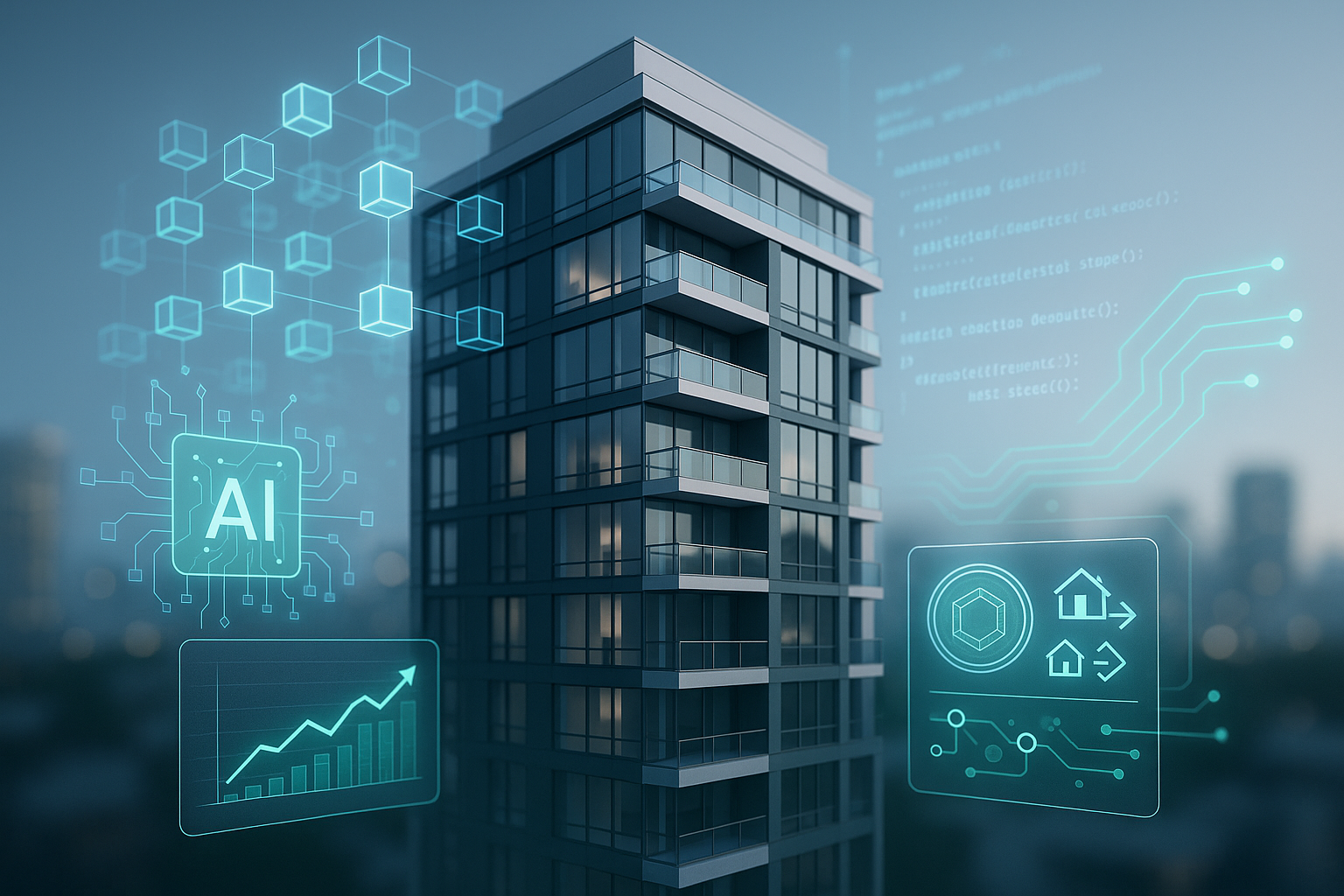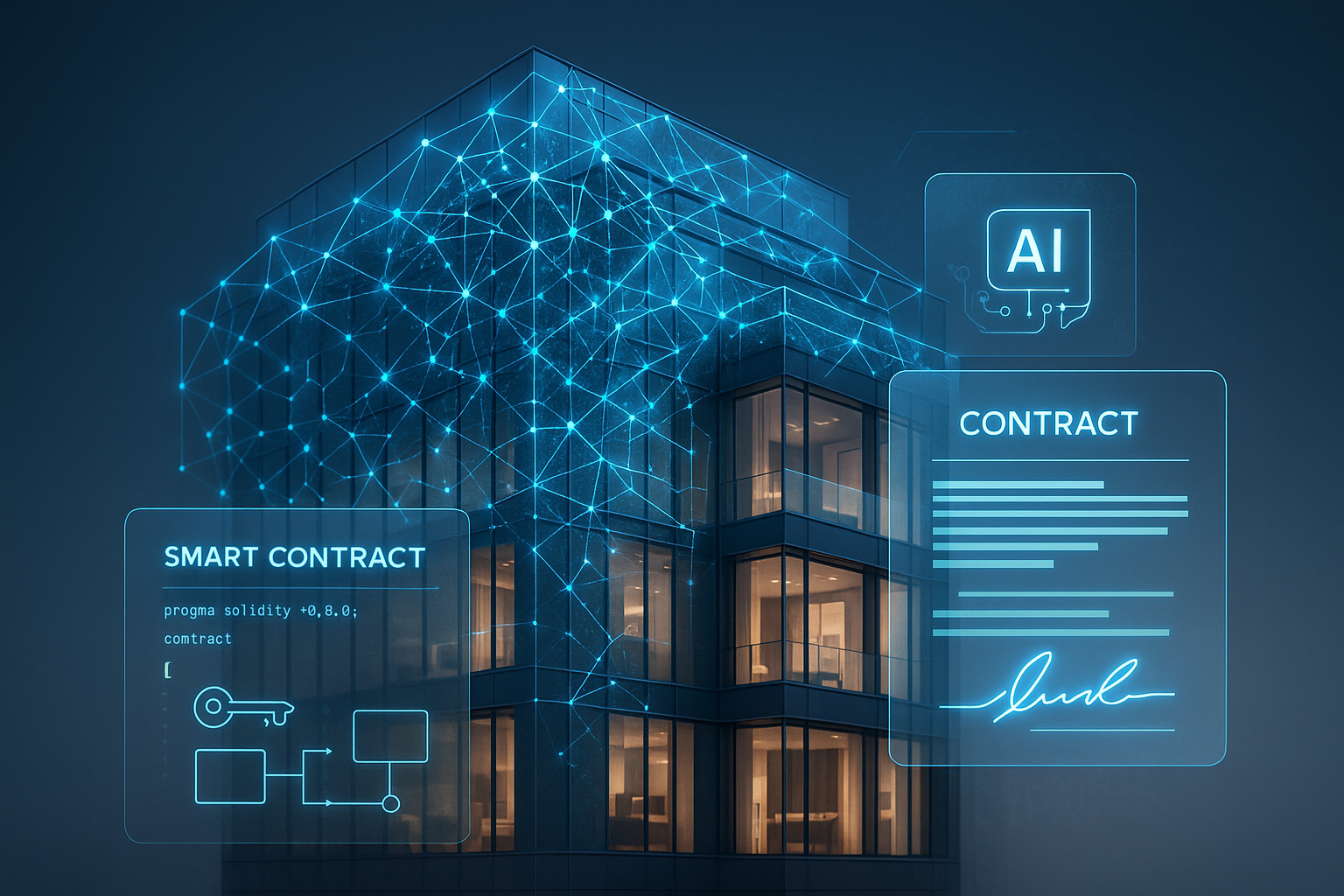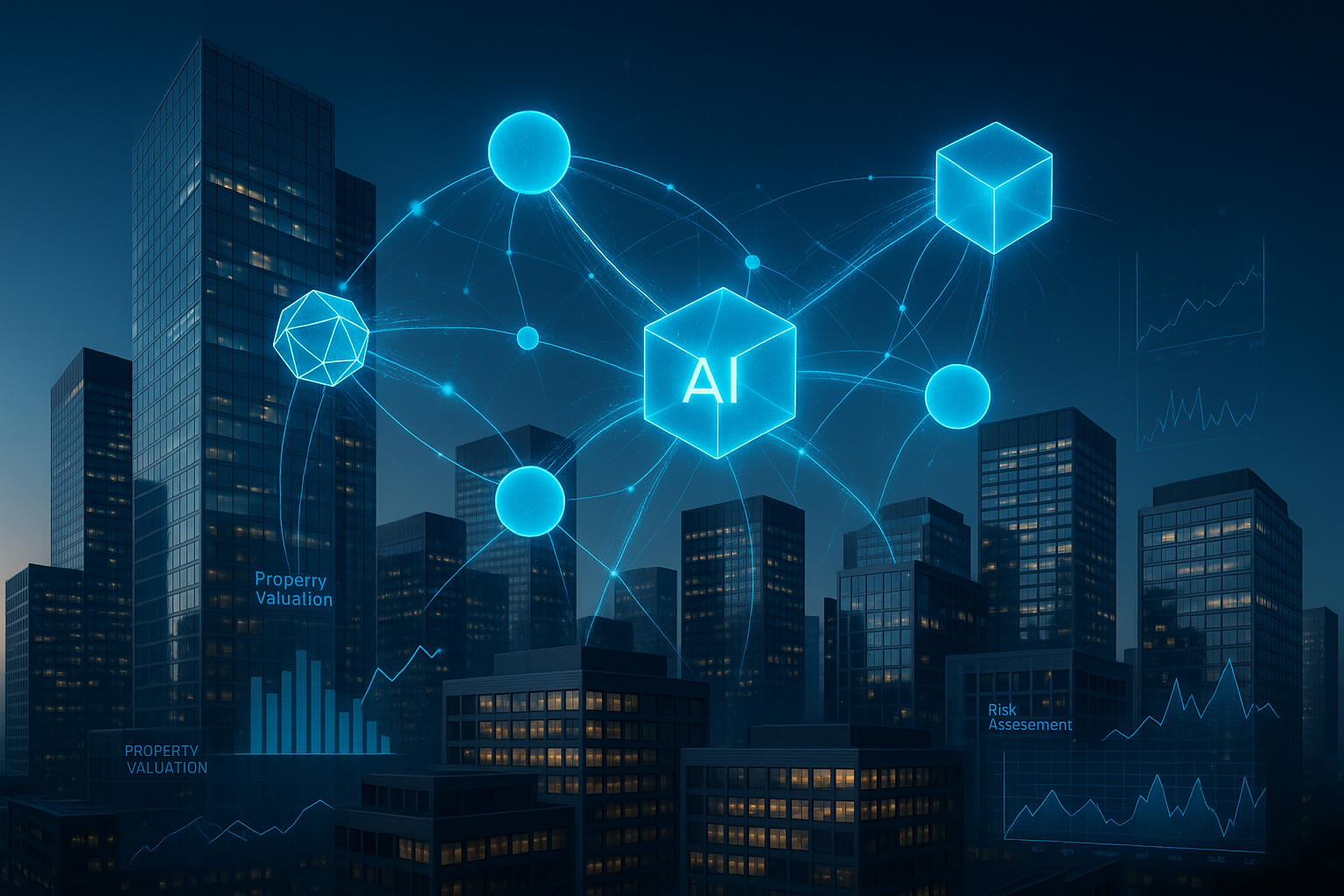
AI-Powered Smart Contracts: Revolutionizing Real Estate Finance in 2025
Caiyman.ai Research Team
AI Solutions Architect
The real estate industry is experiencing its most dramatic transformation in decades. As we advance through 2025, the convergence of artificial intelligence and blockchain technology is reshaping how properties are bought, sold, financed, and managed. According to recent market research, the AI in real estate market is projected to surge from $222.65 billion in 2024 to $301.58 billion in 2025, representing an explosive 35.5% compound annual growth rate.
At the heart of this revolution lies a powerful combination: AI-powered smart contracts operating on blockchain networks. These self-executing digital agreements are eliminating traditional intermediaries, reducing transaction costs by up to 85%, and creating tamper-proof property records that ensure unprecedented transparency and security. Leading platforms like Propy, Harbor, and tokenization solutions are already pioneering real-world implementations that enable fractional ownership and global investment access.
The implications extend far beyond simple automation. This technological fusion is democratizing real estate investment, enabling peer-to-peer financing through decentralized finance (DeFi) protocols, and creating entirely new asset classes through property tokenization. JLL research reveals that among 7,000 global PropTech companies, approximately 700 are currently providing AI-powered solutions, with venture capital serving as the primary catalyst for this transformation.
Understanding AI-Powered Smart Contracts in Real Estate
Smart contracts represent a fundamental shift from traditional paper-based agreements to self-executing digital contracts with terms encoded directly into blockchain infrastructure. When integrated with AI capabilities, these contracts become intelligent agents capable of monitoring market conditions, validating compliance requirements, and automatically executing transactions when predetermined conditions are met.
The technical architecture combines several critical components. As noted by Kurby Real Estate AI, "Smart contract could automatically release funds from a buyer's account to a seller's account once the property title has been transferred. This technology has the potential to make real estate transactions more efficient, secure, and transparent."
Core Technical Components
The foundation of AI-powered smart contracts relies on robust blockchain platforms, primarily Ethereum and Hyperledger, which provide the secure, decentralized infrastructure necessary for real estate applications. AI agents continuously monitor these contracts, automatically executing predefined conditions while Oracle integration connects off-chain property data—such as title records, inspection reports, and regulatory compliance documents—to the blockchain environment.
These systems enable real-time validation of critical transaction elements including title checks, funds availability, and regulatory requirements. The enhanced security comes through tamper-proof, transparent transaction logging that creates an immutable audit trail accessible to all authorized parties.
Automated Transaction Workflows
Modern implementations streamline complex processes that traditionally required weeks or months to complete. Document verification and title transfer automation eliminate manual processing delays, while fund release mechanisms operate based on predetermined milestones rather than human intervention. Compliance checking and regulatory requirement validation occur automatically, ensuring all transactions meet legal standards without manual oversight.
According to AscendixTech's analysis, "Blockchain technology is used to create tamper-proof digital ledgers, streamlining property transfers and lease agreements by reducing reliance on banks and lawyers. This way, blockchain real estate technology makes property transactions and management independent from the government and financial institutions, fully digitalized, and highly secure."
Revolutionary Financial Models: Tokenization and DeFi Integration
Perhaps the most transformative aspect of AI-powered smart contracts lies in their ability to create entirely new financial models for real estate investment. Property tokenization enables fractional ownership by converting real estate assets into digital tokens that can be traded on blockchain networks, dramatically improving liquidity and reducing minimum investment barriers.
Leading tokenization platforms including Harbor, SolidBlock, RealtyBits, and Slice are pioneering solutions that allow investors to purchase shares in real estate projects through smart contracts, ensuring transparency and security in all transactions. These platforms demonstrate how blockchain technology enables fractional ownership while automated dividend distribution and rental income sharing occur seamlessly through smart contract execution.
The integration with traditional financial systems represents a crucial bridge between innovative blockchain solutions and established institutional infrastructure. Rapid Innovation notes that "there is a trend towards integrating tokenized assets with traditional financial systems, allowing for easier access to capital. This could involve partnerships between blockchain firms and established financial institutions, enhancing the landscape for real estate tokenization projects."
Decentralized Finance (DeFi) protocols further expand possibilities by facilitating peer-to-peer real estate financing without traditional banking intermediaries. These systems enable automated payments, transparent fund management, and sophisticated lending mechanisms that operate entirely through smart contract logic. Blockchain-based property tokens can be traded on decentralized exchanges (DEX) and NFT platforms, creating liquid markets for previously illiquid real estate assets.
The accessibility improvements are substantial. According to institutional CRE analysis, "Smart contracts can automate and enforce various agreements and processes, such as lease payments, property transactions, or fund distributions, reducing the need for intermediaries and minimizing transaction costs. AI can play a role in managing these decentralized systems, for example, by providing analytics for tokenized asset performance."
Current Market Leaders and Implementation Examples
The practical implementation of AI-powered smart contracts is already demonstrating remarkable success across both commercial and residential real estate sectors. Several pioneering platforms are setting industry standards for blockchain-based property transactions and AI-driven automation.
Commercial Real Estate Platforms
VTS (View The Space) leads commercial real estate innovation with an AI-driven platform that enhances leasing, asset management, and tenant relationships through sophisticated data analytics and workflow automation. With a 4.6/5 rating, VTS demonstrates how AI can revolutionize portfolio management for institutional investors including REITs.
Cherre represents another breakthrough in AI-powered real estate data analytics, earning a 4.7/5 rating for its platform that connects and analyzes comprehensive real estate data to enable smarter investment and management decisions. The platform exemplifies how AI can process vast datasets to provide actionable insights for commercial property optimization.
Site To Do Business enhances decision-making capabilities through Smart Maps and Market Analysis tools that allow users to visualize data geographically, optimizing property management with real-time insights. These tools demonstrate the strategic integration of AI and blockchain technologies that characterize the current PropTech evolution.
Residential Market Innovations
Propy stands as the flagship example of end-to-end blockchain property transaction platforms, using smart contracts to automate the entire buying process from initial offer to final closing. The platform demonstrates how blockchain technology can eliminate traditional intermediaries while maintaining security and transparency throughout complex real estate transactions.
Zillow's AI algorithms have revolutionized lead generation and property valuation by identifying potential clients based on online behavior and demographics, automating processes that traditionally required significant manual effort. Despite a 4.1/5 rating, Zillow's scale demonstrates the market appetite for AI-driven real estate solutions.
DealMachine's Alma AI assistant, developed in partnership with OpenAI, provides investment property analysis including potential rental income calculations and repair cost estimates. This democratization of real estate investing exemplifies how AI assistants are making sophisticated analysis accessible to individual investors.
Rex Real Estate showcases the power of comprehensive automation, using AI to automate 85% of transaction workflows including contract analysis, compliance checks, and document processing. The platform's natural language processing capabilities identify discrepancies in agreements and suggest optimizations for faster closings.
Success metrics from early adopters indicate substantial ROI improvements through reduced processing times, lower transaction costs, and enhanced accuracy in property valuations and market analysis. These platforms collectively demonstrate that AI-blockchain integration has moved beyond experimental phases into proven, scalable business solutions.
Security Protocols and Regulatory Compliance Framework
The implementation of AI-powered smart contracts in real estate requires robust security protocols and comprehensive regulatory compliance frameworks to ensure widespread enterprise adoption. Security considerations encompass both the technical infrastructure and the regulatory environment in which these systems operate.
Zero-trust architecture forms the foundation of secure smart contract implementation, employing multi-layered security approaches that verify every transaction and user interaction. Smart contract auditing using formal verification tools ensures code integrity before deployment, while ongoing security protocols monitor for potential vulnerabilities or attempted exploits.
Regulatory compliance presents complex challenges requiring adherence to multiple frameworks including GDPR for data privacy, SEC regulations for securities transactions, FinCEN requirements for financial reporting, and various valuation standards that govern property assessments. As noted in institutional analysis, "Technologies like blockchain and smart contracts aim to enhance transaction transparency and validity in commercial real estate, but depend on adoption, robust governance structures, compliance mechanisms, and scalability."
AI governance models must ensure explainability and maintain comprehensive audit trail requirements. This involves implementing systems that can provide clear reasoning for automated decisions, particularly important for regulatory compliance and dispute resolution. Risk management frameworks must address model bias, cybersecurity threats, data drift, and regulatory uncertainty while maintaining operational efficiency.
Integration challenges with legacy property record systems remain significant. Most existing property databases operate on centralized systems with varying data standards and access protocols. Successful blockchain implementation requires careful planning to bridge these legacy systems while maintaining data integrity and regulatory compliance.
Legal recognition and enforceability of blockchain-based property transactions vary significantly across jurisdictions. Organizations must navigate complex legal landscapes while ensuring smart contracts meet local property law requirements and maintain enforceability in traditional court systems.
Future Trends and Strategic Adoption Roadmap
The trajectory of AI-powered smart contracts in real estate points toward several transformative trends that will shape industry development through 2025 and beyond. PropTech investment patterns are shifting toward sustainability, efficiency, and long-term value creation, with venture capital focusing specifically on AI, Data & Analytics, and emerging technologies that drive measurable business outcomes.
The integration of IoT sensors with AI-powered building management systems represents a significant growth area, enabling smart buildings that autonomously optimize energy consumption, predict maintenance needs, and enhance tenant experiences. This convergence creates comprehensive ecosystems where property management, financial transactions, and operational optimization occur seamlessly through interconnected smart contract networks.
Sustainable and eco-friendly tokenized real estate projects are emerging as investor interest in socially responsible investments continues to grow. Future trends include tokenizing sustainable real estate projects, with investors increasingly interested in green properties and ESG-compliant investment opportunities that can be tracked and verified through blockchain technology.
Enhanced regulatory frameworks are expected to accelerate mainstream adoption as government agencies develop clearer guidelines for tokenization and smart contract implementation. This regulatory clarity will enable larger institutional investors to enter tokenized real estate markets while providing the legal certainty necessary for widespread enterprise adoption.
Multi-agent AI systems will orchestrate increasingly complex real estate portfolios, with specialized AI agents handling different aspects of property management, from tenant relations to predictive maintenance to investment optimization. These systems will enable unprecedented automation and optimization across entire real estate ecosystems.
Enterprise adoption strategies must emphasize employee upskilling and comprehensive change management programs. Organizations implementing AI-blockchain solutions need structured approaches to workforce development, ensuring teams can effectively operate in augmented environments where human expertise combines with AI capabilities.
Market consolidation around leading platform providers is likely as the industry matures, with successful platforms expanding their capabilities while smaller players either specialize in niche markets or merge with larger competitors. This consolidation will drive standardization and interoperability improvements across the PropTech ecosystem.
Embracing the Future of Real Estate Finance
The integration of AI and blockchain technology in real estate represents a fundamental transformation rather than merely incremental improvement. Early adopters are already demonstrating significant competitive advantages through improved efficiency, reduced costs, enhanced security, and access to new markets and investment opportunities.
Technology maturation is creating unprecedented opportunities for broader market participation. As platforms become more user-friendly and regulatory frameworks provide greater clarity, the barriers to entry for both individual and institutional investors continue to decrease. The democratization of real estate investment through tokenization and automated portfolio management enables participation across global markets that were previously accessible only to large institutional players.
The critical importance of choosing appropriate implementation partners and platforms cannot be overstated. Organizations must evaluate vendors based on technical capabilities, regulatory compliance, security protocols, and long-term viability. The decision to implement AI-powered smart contracts affects not only immediate operational efficiency but also long-term competitive positioning in an increasingly digital real estate landscape.
Success requires a balanced approach that combines technological innovation with robust regulatory compliance and risk management. Organizations that move too quickly without adequate security and compliance frameworks risk regulatory penalties and security breaches, while those that move too slowly may find themselves at significant competitive disadvantages as market leaders establish dominant positions.
The transformation is irreversible and accelerating. As industry analysis indicates, "AI combined with blockchain technology is transforming the way transactions are conducted. In 2025, smart contracts powered by AI will automate the legal and financial processes involved in real estate deals. This not only reduces paperwork but also ensures greater transparency and security in transactions, creating trust among buyers and sellers."
Transform Your Real Estate Operations with Expert AI Implementation
The convergence of AI and blockchain technology in real estate finance presents unprecedented opportunities for organizations ready to embrace digital transformation. However, successful implementation requires deep expertise in both technological capabilities and industry-specific requirements.
Partner with Caiyman.ai for comprehensive AI and blockchain integration strategy tailored to your real estate operations. Our team combines cutting-edge technical expertise with deep industry knowledge to develop customized smart contract solutions, automated valuation systems, and tokenization strategies that drive measurable business results while ensuring regulatory compliance and security.
Schedule a consultation with our experts to develop a customized smart contract and automation roadmap for your organization. We'll help you navigate the complex landscape of AI-powered real estate technology, identify the most valuable implementation opportunities, and create a strategic adoption plan that positions your organization for success in the digital real estate economy.
Sources
- How AI is Changing the Landscape of Real Estate Finance - Kurby Real Estate AI
- Smart Contracts in Real Estate 2024: Ultimate Guide Benefits & Future - Rapid Innovation
- Real Estate & PropTech Market Update Q4 2024 - Vista Point Advisors
- AI and Blockchain: The Dynamic Duo Transforming Real Estate Transactions - Agreements.ai
- Artificial Intelligence - Implications for Real Estate - JLL Research
- Real Estate Tokenization: The Ultimate Guide for Investors in 2024 - Rapid Innovation
- AI in Institutional CRE Analysis - Google Doc
- PROPTECH 2024: Ushering In a Smarter Era - CCIM Institute
- AI In Real Estate Market Report Opportunities 2025
- Real Estate Technology Trends of 2024-2025 by AscendixTech
- How AI Is Transforming Real Estate Market in 2025
- 10 Proptech Trends in 2025: Digital Acceleration in Real Estate
- 11 Best AI Tools for Real Estate Agents to Boost Sales 2025
Share this article
Related Articles

AI-Powered Smart Contracts in Real Estate: Complete 2025 Implementation Guide
Essential guide for real estate professionals implementing AI-powered smart contracts, featuring platform comparisons, security frameworks, and strategic roadmaps for blockchain adoption in property transactions.

AI in Real Estate Finance: $34B Opportunity Transforms Property Investment in 2025
Discover how artificial intelligence is creating $34 billion in efficiency gains for real estate finance, with 37% of tasks now automatable and major platforms achieving 99%+ accuracy in property valuation.

Multi-Agent AI Systems Transforming Commercial Real Estate Finance in 2025
Discover how multi-agent LLM frameworks are revolutionizing CRE finance, with 60% of institutional investors now using AI for underwriting and asset management while achieving 20% reductions in valuation discrepancies.